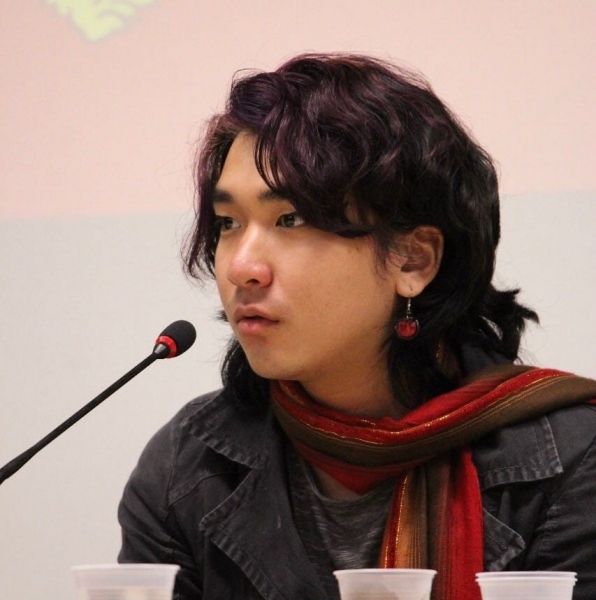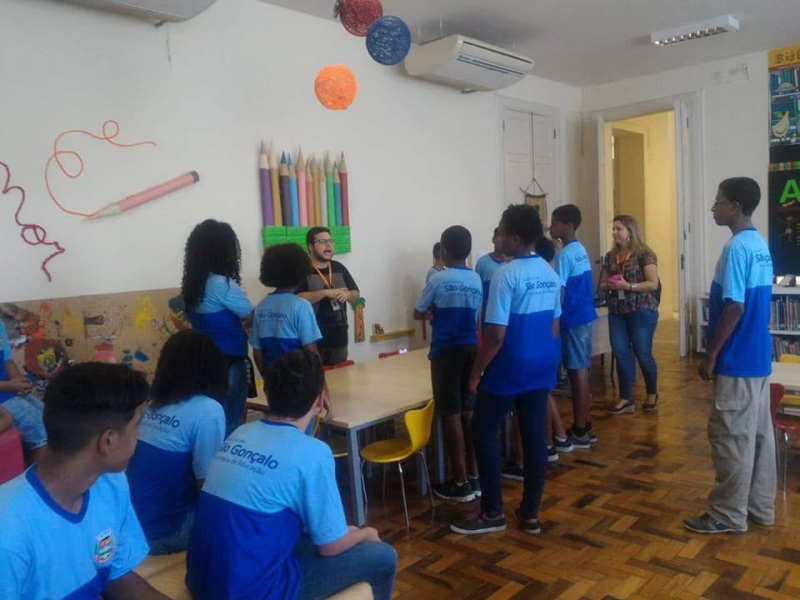According to data from the 2010 Census, 2 million Brazilian residents declare themselves to be of yellow color or race, a number that has grown 177% in a decade. The term “yellow” refers to descendants of Japanese, Chinese, Taiwanese, Koreans, and other groups whose families left East Asia for Brazil. However, what is observed is a perpetuation of prejudices against this part of the population: expressions such as “Asians are all the same”, “you must know a lot about mathematics”, and “open your eyes, Japanese” reinforce stereotypes based on biological and that involve Brazilians of Asian descent.
 This reality led to the academic trajectory of Hugo Katsuo Othuki Okabayashi, graduating in Cinema and Audiovisual at UFF. In 2018, Hugo started directing a documentary entitled O Perigo Amarelo Nos Dias Atuais as teaching material on what yellow militancy is in Brazil. Although not officially launched, the project was shown at an event held at UFF, with an exhibition and debate held in November 2018, and at other institutions in the country, such as the Universidade de São Paulo. “The way I want to work with yellow issues in the audiovisual is to bring representation in a more humane way. I want to show that we are as human as white people and not a homogeneous mass, walking caricatures,” explains the filmmaker and researcher.
This reality led to the academic trajectory of Hugo Katsuo Othuki Okabayashi, graduating in Cinema and Audiovisual at UFF. In 2018, Hugo started directing a documentary entitled O Perigo Amarelo Nos Dias Atuais as teaching material on what yellow militancy is in Brazil. Although not officially launched, the project was shown at an event held at UFF, with an exhibition and debate held in November 2018, and at other institutions in the country, such as the Universidade de São Paulo. “The way I want to work with yellow issues in the audiovisual is to bring representation in a more humane way. I want to show that we are as human as white people and not a homogeneous mass, walking caricatures,” explains the filmmaker and researcher.
The preservation of the memory of his ancestors from Japan was the starting point for the student to start research on ethnic-racial relations in Brazil involving yellow bodies — which, to his surprise, proved to be an area that is still little explored. “I started to study about the experience of non-continental Asians nowadays. Then came the theme of my Undergraduation’s Final Project, with an outline for the representation and consumption of the yellow body in western gay porn cinema. Researching about this was and is very important for my identity construction processes,” says Hugo.
Asian issues have some similarities with those involving black bodies, mainly because the processes of racialization and racism have a common origin: the maintenance of white supremacy. For the graduate, “Asians are stereotyped as the ‘model minority’, that is, the minority that worked, as opposed to minorities that did not work — blacks and indigenous people. Therefore, the main difference between Asians and blacks is that Asians have been granted the privileges of ‘almost white’.”
 The consequences of racial prejudice against yellow people fostered discussions about these specific oppressions, mainly in collectives and profiles on social networks (Perigo Amarelo and Asiáticos pela Diversidade on Facebook, for example), also debating texts, personalities, and historical facts that rescue relationships of power originated mainly from migratory flows in the country in the 20th century, constituting the movement known as yellow militancy.
The consequences of racial prejudice against yellow people fostered discussions about these specific oppressions, mainly in collectives and profiles on social networks (Perigo Amarelo and Asiáticos pela Diversidade on Facebook, for example), also debating texts, personalities, and historical facts that rescue relationships of power originated mainly from migratory flows in the country in the 20th century, constituting the movement known as yellow militancy.
It is extremely important to engage in academic debates about Asia in its various contexts; certain speeches begin to be legitimized from this sphere. And the realization of this process needs everyone’s help. “I think it is important that white people listen to us, read our productions, and be always attentive, taking a stance against the various forms of racism on a daily basis, but without ever pretending to want to speak for us,” he emphasizes.
Asia as a power in the academic circuit
According to the article published by British bank Standard Chartered, published in August 2019, Asian nations have exceeded expectations of economic growth in a world scenario of stagnation. The incentive to domestic demand and the reduced dependence on western economies will allow, in the next years, according to the study, the economic growth of 7% for countries like India, Bangladesh, Vietnam, and the Philippines — a pace at which an economy generally doubles in size with each decade. Despite the relative development in the global market, the Asian continent is still largely invisible in the academic circuit, an environment in which its socio-historical context is little explored or presented from a Westernized perspective.
 From the less Eurocentric proposal of a reinvention in the academic field with the valorization of studies on Asia, master’s students from Universidade Federal Fluminense created, in 2018, the Center for Asian Studies. With the initial goal of organized reading of texts and debates, the team involved in the project began to receive invitations for discussions and events. Initially presenting mini-courses on the conduct of Asian studies in the humanities, the center was invited to carry out this format outside the academic environment, at the Biblioteca Parque of Niterói.
From the less Eurocentric proposal of a reinvention in the academic field with the valorization of studies on Asia, master’s students from Universidade Federal Fluminense created, in 2018, the Center for Asian Studies. With the initial goal of organized reading of texts and debates, the team involved in the project began to receive invitations for discussions and events. Initially presenting mini-courses on the conduct of Asian studies in the humanities, the center was invited to carry out this format outside the academic environment, at the Biblioteca Parque of Niterói.
“The response was so positive that we continued to take small courses there; we organized, for example, a program for elementary school students at the Municipal School Pastor Ricardo Parise,” says, the Master’s student of History and one of the creators of the project, Mateus Nascimento. Public school students were at the Biblioteca Parque and the members of the center introduced them to some themes of Asian history, such as Russian (alphabet), Japanese (kanji), and Chinese culture (tai chi chuan). “The connection was interesting because it allowed us to rethink our objective: today the center is concerned with research, teaching, and outreach in Asian studies and also seeks to develop teaching and research activities, but also scientific dissemination, such as this activity with public and private schools. Eurocentrism dictates our scientific agendas, our ways of seeing the world and being subjects, and when you propose to challenge that, you are liberating due to the amount of knowledge you acquire.”
I think that the university has a role to play as a vanguard of social thought, and the example of Asian countries shows alternative development models to that of the West.
Afonso de Albuquerque
One of the problems that guide the Center for Asian Studies academic production and debate starts from the evident Eurocentrism that structures the curricula of Humanities (and other areas): the knowledge of the way we have it has European thinking as its starting point. “When we study modern history, for example, we start from the outside, ‘from the great navigations’ and only after we quickly see elements native to Brazilian territory. Even so, we look through the lens of the violence of colonization. With regard to the areas of health, it is the French principles that disallow studies on oriental medicine,” justifies Mateus.
 The existence of the Center offers an effective possibility of dialogue between the human and social sciences with the elements of Asian pop culture, a panorama of analysis quite emphasized by the Research Group on Contemporary Asian Media and Culture (MidiÁsia), a project also from UFF, which brings together researchers interested in exploring issues related to media development in the context of Asian countries and their global impact.
The existence of the Center offers an effective possibility of dialogue between the human and social sciences with the elements of Asian pop culture, a panorama of analysis quite emphasized by the Research Group on Contemporary Asian Media and Culture (MidiÁsia), a project also from UFF, which brings together researchers interested in exploring issues related to media development in the context of Asian countries and their global impact.
The group’s purpose is linked to the construction of theoretical and methodological references that address the current context of reconfiguration of the global media arena. For this, six researchers are associated with the group — two professors with PhDs and four undergraduate students. “In a scenario in which international media culture increasingly assumes multipolar features, the Asian continent, with its enormous social and cultural diversity, offers a fertile and unexplored terrain for research,” emphasizes the PhD in Communication from the Graduate Program in Communication and member of MidiÁsia, Krystal Cortez.
Created in 2019, the group was conceived and managed by undergraduate students of the institution’s Media Studies course and the Communication Graduate Program, under the coordination of professor Afonso de Albuquerque. “It is evident that the place that Asia plays in the world today is entirely different from that of a decade ago. I think that the university has a role to play as a vanguard of social thinking, and the example of Asian countries shows alternative development models to that of the West,” explains the researcher.




